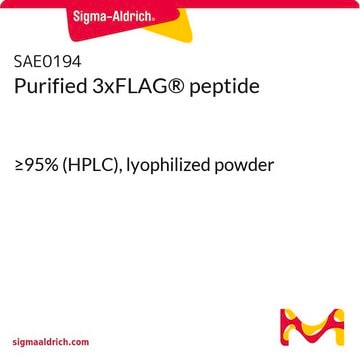E7908
p3XFLAG-CMV™-14 Expression Vector
shuttle vector for transient or stable intracellular expression of C-terminal 3xFLAG
Se connecterpour consulter vos tarifs contractuels et ceux de votre entreprise/organisme
About This Item
Code UNSPSC :
12352200
Produits recommandés
Étiquette/Marqueur
3X FLAG tagged
Qualité
for molecular biology
Forme
buffered aqueous solution
Conditions d'expédition
dry ice
Température de stockage
−20°C
Description générale
The p3XFLAG-CMV™-14 Expression Vector is a 6.3 kb derivative of pCMV51 used to establish expression of transient or stable intracellular C-terminal 3XFLAG™ fusion proteins in mammalian cells. The vector encodes three adjacent FLAG® epitopes (Asp-Tyr-Lys-Xaa-Xaa-Asp) downstream of the multiple cloning region. This results in increased detection sensitivity using ANTI-FLAG M2 antibody. Efficiency of replication and genomic integration is optimal when using an SV40 T antigen-expressing host.
The p3XFLAG-CMV-7-BAP Control Plasmid is a 6.2 kb derivative of pCMV5 used for transient intracellular expression of N-terminal 3XFLAG bacterial alkaline phosphatase fusion protein in mammalian cells. The vector encodes three adjacent FLAG epitopes (Asp-Tyr-Lys-Xaa-Xaa-Asp) upstream of the multiple cloning region. This results in increased detection sensitivity using ANTI-FLAG M2 antibody. The third FLAG epitope includes the enterokinase recognition sequence, allowing cleavage of the 3XFLAG peptide from the purified fusion protein.
Vector Maps and Sequences
The p3XFLAG-CMV-7-BAP Control Plasmid is a 6.2 kb derivative of pCMV5 used for transient intracellular expression of N-terminal 3XFLAG bacterial alkaline phosphatase fusion protein in mammalian cells. The vector encodes three adjacent FLAG epitopes (Asp-Tyr-Lys-Xaa-Xaa-Asp) upstream of the multiple cloning region. This results in increased detection sensitivity using ANTI-FLAG M2 antibody. The third FLAG epitope includes the enterokinase recognition sequence, allowing cleavage of the 3XFLAG peptide from the purified fusion protein.
Vector Maps and Sequences
Composants
- p3XFLAG-CMV™-14 Expression Vector 20 μg (E4901) is supplied as 0.5 mg/ml in 10 mM Tris-HCl (pH 8.0) with 1 mM EDTA.
- p3XFLAG-CMV™-7-BAP Control Plasmid 20 μg (C7472) is supplied as 0.5 mg/ml in 10 mM Tris-HCl (pH 8.0) with 1 mM EDTA.
Principe
The promoter-regulatory region of the human cytomegalovirus drives transcription of FLAG®-fusion constructs
Autres remarques
Browse additional application references in our FLAG® Literature portal.
Informations légales
This product is covered by the following patents owned by Sigma-Aldrich Co. LLC: US6,379,903, US7,094,548, JP4405125,EP1220933, CA2386471 and AU774216.
3xFLAG is a trademark of Sigma-Aldrich Co. LLC
FLAG is a registered trademark of Merck KGaA, Darmstadt, Germany
p3xFLAG-CMV is a trademark of Sigma-Aldrich Co. LLC
Produit(s) apparenté(s)
Réf. du produit
Description
Tarif
Code de la classe de stockage
10 - Combustible liquids
Faites votre choix parmi les versions les plus récentes :
Certificats d'analyse (COA)
Lot/Batch Number
Vous ne trouvez pas la bonne version ?
Si vous avez besoin d'une version particulière, vous pouvez rechercher un certificat spécifique par le numéro de lot.
Déjà en possession de ce produit ?
Retrouvez la documentation relative aux produits que vous avez récemment achetés dans la Bibliothèque de documents.
Tom R Webb et al.
Endocrinology, 150(2), 720-726 (2008-09-27)
Melanocortin 2 receptor (MC2R) is the receptor for the pituitary hormone ACTH. When activated, MC2R stimulates cAMP production and adrenal steroidogenesis. The functional expression of the receptor requires melanocortin 2 receptor accessory protein (MRAP), a single-transmembrane domain protein involved in
Bengt Phung et al.
PloS one, 6(8), e24064-e24064 (2011-09-03)
The development of melanocytes is regulated by the tyrosine kinase receptor c-KIT and the basic-helix-loop-helix-leucine zipper transcription factor Mitf. These essential melanocyte survival regulators are also well known oncogenic factors in malignant melanoma. Despite their importance, not much is known
Qi-En Wang et al.
Cancer research, 72(3), 666-675 (2011-12-17)
XPC protein is a critical DNA damage recognition factor in nucleotide excision repair for which genetic deficiency confers a predisposition to cancer. In this study, we show that XPC has a function that is independent of its canonical function in
Zhi Sheng et al.
Molecular and cellular biology, 25(21), 9419-9426 (2005-10-18)
Fibroblast growth factor 2 (FGF-2), which is highly expressed in developing tissues and malignant cells, regulates cell growth, differentiation, and migration. Five isoforms (18 to approximately 34 kDa) of FGF-2 are derived from alternative initiation codons of a single mRNA.
Viorel Simion et al.
JCI insight, 5(21) (2020-10-07)
Long noncoding RNAs (lncRNAs) play important roles in regulating diverse cellular processes in the vessel wall, including atherosclerosis. RNA-Seq profiling of intimal lesions revealed a lncRNA, VINAS (Vascular INflammation and Atherosclerosis lncRNA Sequence), that is enriched in the aortic intima
Notre équipe de scientifiques dispose d'une expérience dans tous les secteurs de la recherche, notamment en sciences de la vie, science des matériaux, synthèse chimique, chromatographie, analyse et dans de nombreux autres domaines..
Contacter notre Service technique








